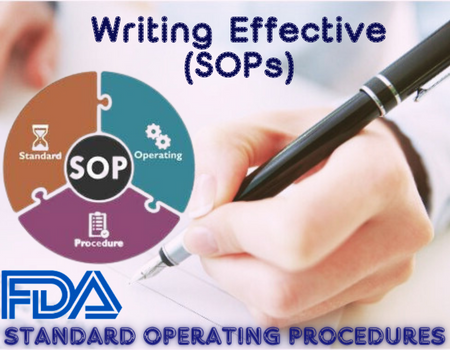Call us: +1-855-202-3299
Email: [email protected]
Navigating FDA Inspections: Strategies for Developing Robust SOPs
Speaker: Meredith Crabtree
Speaker Designation: Quality Management Expert

Call us: +1-855-202-3299
Email: [email protected]
Speaker: Meredith Crabtree
Speaker Designation: Quality Management Expert

Attending this training will help the participants understand the specific requirements and expectations of FDA inspectors, allowing them to develop SOPs that meet regulatory standards and demonstrate compliance. By learning how to write SOPs that satisfy FDA inspectors, participants can proactively identify and address potential compliance gaps or issues. This training will provide them with the knowledge and skills necessary to develop robust and comprehensive SOPs, minimizing the risk of regulatory non-compliance and associated penalties.
Effective SOPs not only satisfy FDA inspectors but also contribute to improved operational efficiency and consistency within an organization. By attending this training, one will learn how to write SOPs that clearly outline procedures, roles, and responsibilities, promoting standardized processes and reducing variability in operations.
Well-written SOPs provide clear instructions on how to perform tasks correctly and safely. By attending this training, participants will gain insights into developing SOPs that prioritize quality and safety, aligning with the FDA's expectations. This can help mitigate risks, reduce errors, and ensure product quality and patient safety.
Formal and documented Standard Operating Procedures (SOPs) serve as the cornerstone for effective operational practices. Within the realm of FDA audits, it's noteworthy that SOP inadequacies rank among the top 5 findings. Furthermore, nearly every shortfall pinpointed in the FDA's 483s and Warning Letters can be linked back to an organization's deficient or non-existent SOPs.
It's important to acknowledge that both the FDA and the majority of regulatory bodies mandate the presence of well-defined written procedures. Notably, when an FDA investigator visits your facility, your SOPs will likely be their initial request. It's a pertinent fact that SOP deficiencies feature prominently among the top 5 discoveries during FDA audits. Such deficiencies have the potential to jeopardize an organization's entire Quality Management System, often culminating in additional FDA observations, product recalls, and in more severe cases, Warning Letters.
This training program is designed to elucidate common errors and advocate best practices, helping organizations convey that their processes are comprehensive, precise, and consistently adhered to.
Attend the webinar to know why written procedures and beneficial and understand the FDA expectations for regulatory requirements and written documents.
In the realm of life sciences and pharmaceuticals, navigating FDA inspections is a critical aspect that demands strategic planning and robust Standard Operating Procedures (SOPs). The strategies for developing robust SOPs encompass various elements, including clarity in communication, consistency in processes, and a keen alignment with FDA regulations. By instilling a culture of quality through SOPs, organizations can not only meet compliance standards but also foster a mindset of continuous improvement. Navigating FDA inspections goes beyond documentation; it involves proactive measures, such as internal audits and regular reviews of SOPs to ensure ongoing relevance and compliance.
Meredith Crabtree has over 30 years of experience in regulated industries, ranging from Blood, Plasma, Tissue, Laboratory, Pharma, Medical Device, Cosmetics, Supplements, and Animal Health. This includes manufacturing, packaging, labeling, and distribution operations. Meredith owns MLKC Consulting specializing in product label reviews, 3rd party inspections, technical writing, FDA Product and Establishment registrations, and Consent Decree and Recall support. She also performs regulatory assessments and Quality training.